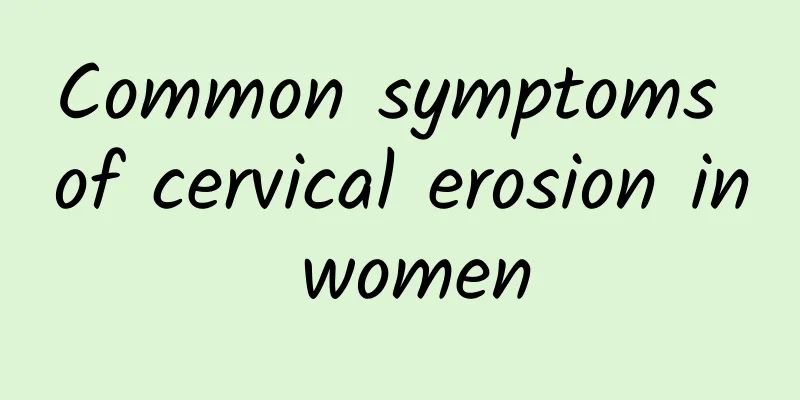What are the symptoms of uterine fibroids? What causes uterine fibroids?

|
What are the symptoms of uterine fibroids? Uterine fibroids are common benign tumors in gynecology, often occurring in women of childbearing age, and their symptoms vary from person to person. Generally speaking, the symptoms of uterine fibroids include abnormal uterine bleeding, irregular menstruation, pelvic pain, etc. Of course, some patients may not have any obvious symptoms. Uterine fibroids are formed by the proliferation of smooth muscle cells in the uterine wall, and their growth may be affected by a variety of factors, such as genetics, estrogen levels, and lifestyle. Preventing uterine fibroids and promptly controlling their symptoms are crucial to women's health. One of the main symptoms of uterine fibroids is abnormal uterine bleeding. Patients may experience heavy menstrual bleeding, shorter menstrual periods, longer menstrual periods, darker menstrual bleeding, or persistent irregular bleeding. Sometimes, patients may even experience blood clots during their periods. These symptoms are mainly due to the location and size of the uterine fibroids affecting the stability and normal shedding process of the endometrium. In addition to abnormal uterine bleeding, uterine fibroids may cause irregular menstruation. It is possible for menstrual periods to be shorter, longer, or completely irregular. Your periods may be frequent and unpredictable, which can make life and daily activities difficult. Sometimes, your periods may be short but frequent. These symptoms often cause you to feel tired and unwell. Pelvic pain is another possible symptom of uterine fibroids. Women may feel pain, pressure, or discomfort in the lower abdomen. This pain is often related to activity or sex and may be accompanied by frequent urination, constipation, or lower back pain. These symptoms may be caused by the fibroids growing larger and pressing on surrounding tissues. In addition, there are other possible symptoms of uterine fibroids, such as bloating, difficulty urinating, bladder infection or pressure symptoms, but these symptoms are rare. In general, uterine fibroid symptoms vary depending on the location, size and number of uterine fibroids, and each person's symptoms may be different. When it comes to uterine fibroids, it is important to understand their symptoms. If a woman experiences symptoms such as abnormal uterine bleeding, irregular menstruation, or pelvic pain, she should seek medical attention for a detailed examination and diagnosis. However, it is important to note that not all symptoms are caused by uterine fibroids, so other possible causes need to be ruled out before drawing conclusions. Early detection and timely treatment of uterine fibroids can help alleviate symptoms, avoid complications, and protect women's reproductive health. In short, the symptoms of uterine fibroids vary from person to person, and common symptoms include abnormal uterine bleeding, irregular menstruation, pelvic pain, etc. For patients with symptoms, it is recommended to seek medical attention in time for comprehensive examination and diagnosis in order to take appropriate treatment measures. By gaining a deeper understanding of the symptoms of uterine fibroids, we can better protect women's reproductive health. |
<<: What does multiple uterine fibroids mean? What is the cause of multiple uterine cysts?
Recommend
What tests can confirm cervicitis?
Cervicitis is a common disease in women of childb...
Detailed explanation of the treatment methods for cervical erosion
The treatment of cervical erosion has always been...
What are the common factors that cause dysmenorrhea?
Dysmenorrhea is something that female friends oft...
Testing for bacterial vaginosis
This disease can often be combined with other vag...
Sleeping habits are key to preventing vulvar leukoplakia
With the acceleration of the pace of modern life,...
What is the treatment method for painless abortion?
What is the treatment method for painless abortio...
There is a secret to losing weight quickly. Combine 4 fat-burning superstars to help you lose weight easily in 2 weeks!
Graduation season is here again, and teacher appr...
What to do after an abortion? 5 routine examinations for women after an abortion
B-ultrasound examination is necessary after painl...
How can a little girl get an ovarian cyst?
The reasons why the little girl got ovarian cysts...
What are the types of uterine fibroids?
Uterine fibroids are the most common benign gynec...
Is there a connection between diarrhea and pelvic inflammatory disease?
Experts have confirmed that pelvic inflammatory d...
Nursing tips for acute pelvic inflammatory disease
Acute pelvic inflammatory disease has a rapid ons...
Analysis of several main causes of vulvar leukoplakia
Vulvar leukoplakia is a common gynecological dise...
This is what everyone should do to regulate irregular menstruation!
Early menstruation, delayed menstruation, heavy m...
Common symptoms of irregular menstruation
Irregular menstruation is a symptom of women'...









